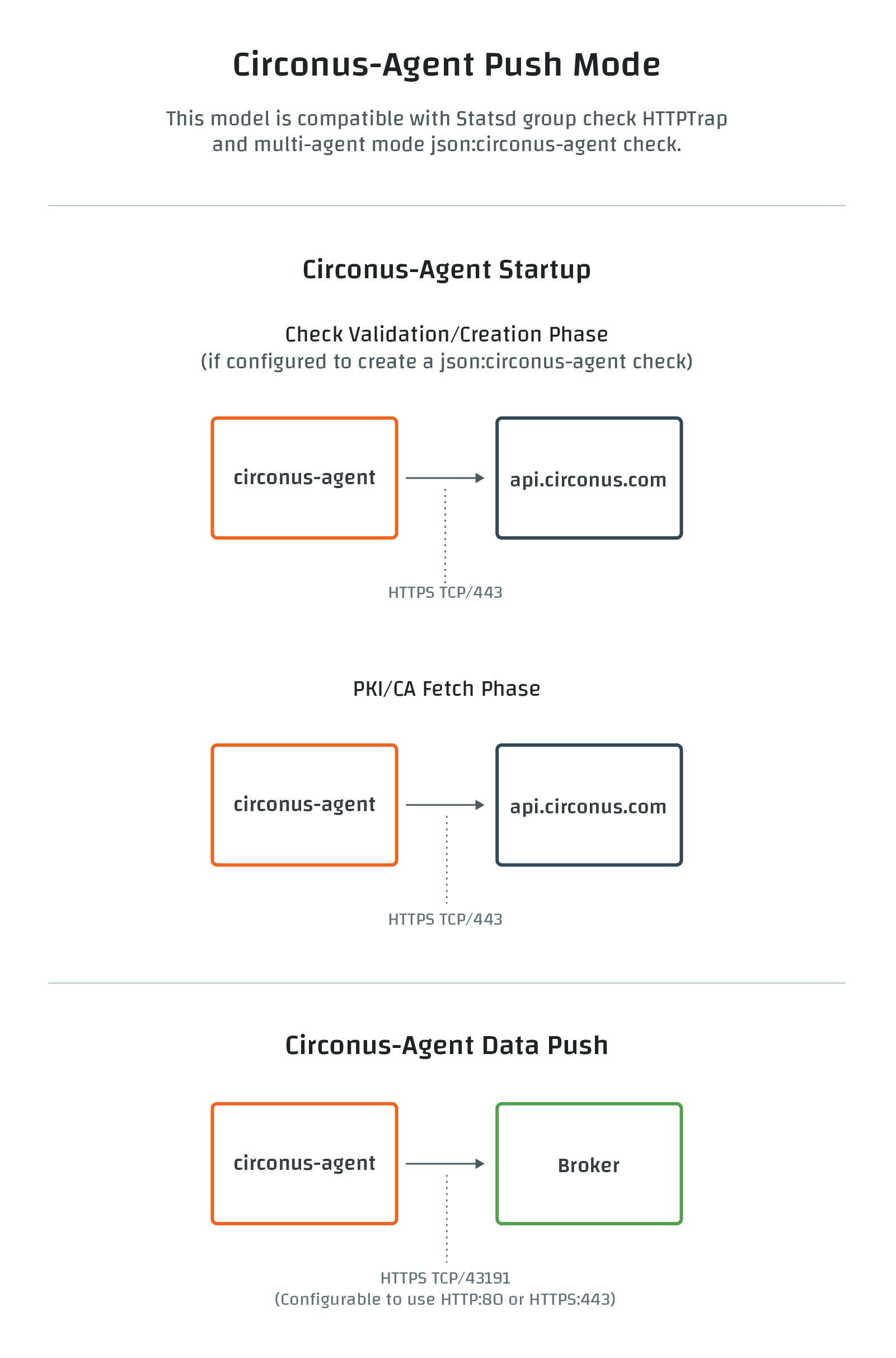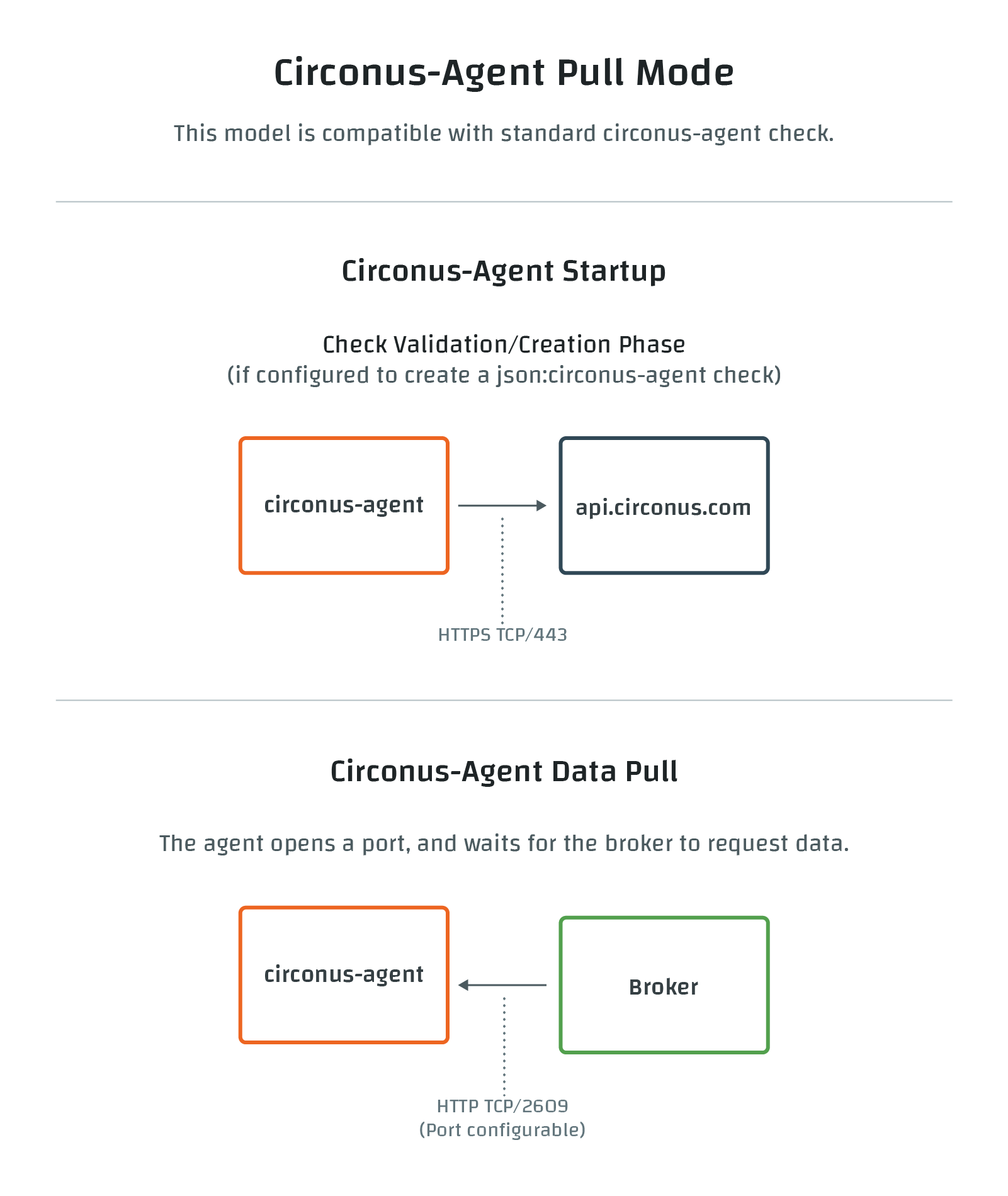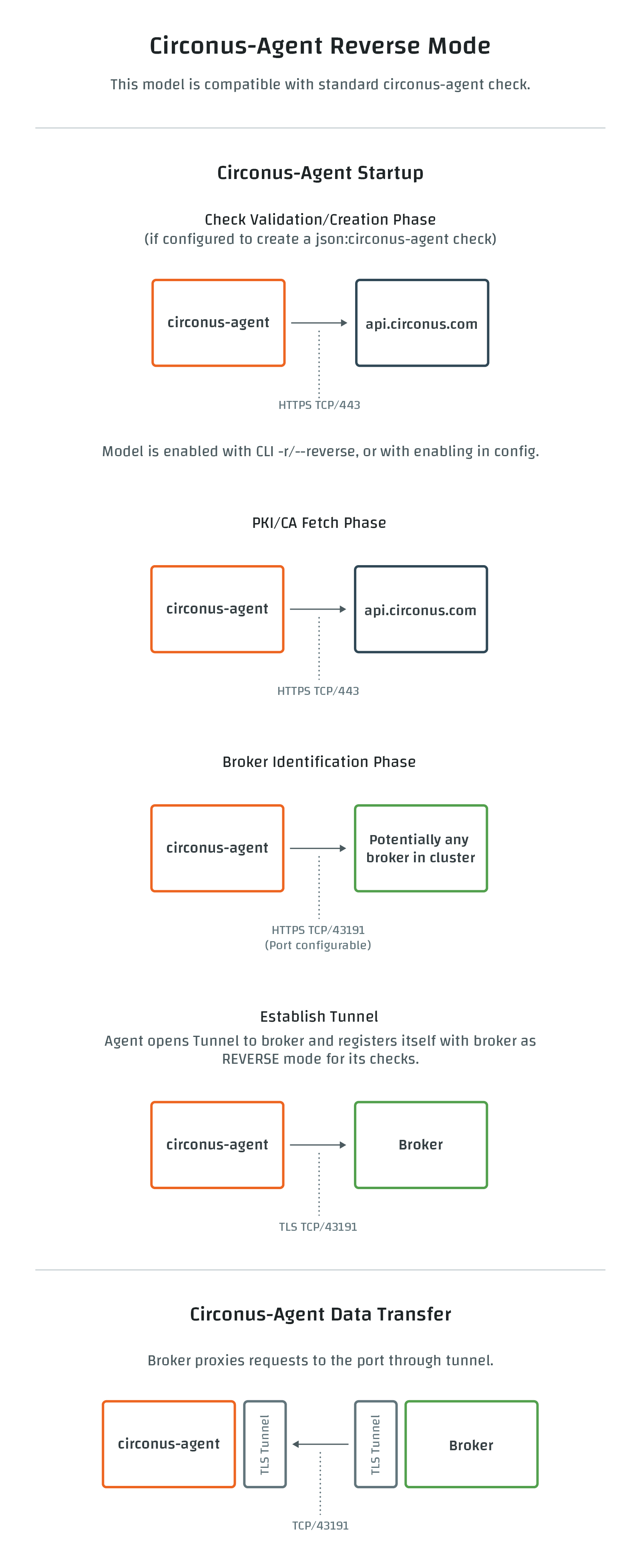Circonus Agent
The circonus-agent is intended to be a drop-in replacement for NAD. There is, however, one specific caveat -- native plugins (.js) do not work. Unless modified to run node independently and follow plugin output guidelines. Additionally, as of v1, the circonus-agent only supports stream tags (if it is dropped in an existing NAD install, the metric names will change). If metric name continuity is required, use the v0 circonus-agent releases.
How It Works
Circonus-Agent Push Mode
When the agent first starts up, it looks for a corresponding check in Circonus (it matches via tags and metadata). If it does not find a matching check, it creates a new check if configured to do so, then data collection can begin. When running in “push” mode, the data is collected by the agent and submitted to the appropriate broker at the configured interval.

Circonus-Agent Pull Mode
When the agent first starts up, it looks for a corresponding check in Circonus (it matches via tags and metadata). If it does not find a matching check, it creates a new check if configured to do so, then data collection can begin. When running in “pull” mode, the data is collected by the Agent, but it waits there until the broker contacts the agent and requests the data at the configured interval.

Circonus-Agent Reverse Mode
When the agent first starts up, it looks for a corresponding check in Circonus (it matches via tags and metadata). If it does not find a matching check, it creates a new check if configured to do so, then data collection can begin. When running in “reverse” mode, the data is collected by the agent and at the configured interval, the agent creates a TLS tunnel to the appropriate Broker. This indicates that there’s data to be collected, and the broker then requests the data from the agent.

Features
- Replacement for NAD, written in go
- Builtin metric collectors -- the default Linux builtins emit the common metrics needed for COSI visuals (graphs, worksheets, & dashboards)
- Plugin architecture for local metric collection
- Local HTTP Receiver for POST/PUT metric collection
- Local StatsD listener for application metrics
- Prometheus format support
- Receive HTTP
PUT|POSTto/promendpoint (e.g.PUT http://127.0.0.1:2609/prom) - Fetch (see Prometheus collector for details)
- Extract HTTP
GETof/promendpoint will emit metrics in Prometheus format (e.g.GET http://127.0.0.1:2609/prom)
- Receive HTTP
Releases
Releases provide pre-built binaries for Linux (arm and x86_64), FreeBSD (x86_64), Solaris (x86_64), and Windows (x86_64).
Install
Automated via COSI
curl -sSL https://setup.circonus.com/install | bash \
-s -- \
--cosiurl https://setup.circonus.com/ \
--key <insert api key> \
--app <insert api app>
Features of the COSI installed circonus-agent on Linux systems:
- includes (if OS supports) protocol_observer, no longer needs to be built/installed manually
- includes (if OS supports) circonus-logwatch, no longer needs to be installed manually
- includes OS/version/architecture-specific NAD plugins (non-javascript only) -- Note: the circonus-agent is not capable of using NAD native plugins since they require NodeJS
Operating Systems (x86_64 and/or amd64) supported by COSI:
- RHEL7 (CentOS, RedHat, Oracle)
- RHEL6 (CentOS, RedHat, amzn)
- Ubuntu18
- Ubuntu16
- Debian9
- Debian8
- FreeBSD 12
- FreeBSD 11
Please continue to use the original COSI(w/NAD) for OmniOS and Raspian - COSI v2 support for these is TBD. Note: after installing NAD a binary circonus-agent can be used as a drop-in replacement (configure circonus-agent plugins directory to be NAD plugins directory -- javascript plugins will not function). Binaries for OmniOS (solaris_x86_64) and Raspian (linux_arm) are available in the circonus-agent repository.
Manual Upgrade COSI Installed NAD
Note: v1+ of the agent supports stream tags only. This will change metric names in any existing checks if a NAD install is updated. To maintain metric name continuity, use the v0 circonus-agent release packages.
mkdir -p /opt/circonus/agent- Download latest release from repository (v0 or v1 - see note above)
- Extract archive into
/opt/circonus/agent - If planning to use
--check-enable-new-metrics, ensure thestatedirectory is owned by the usercirconus-agentdwill run as -- note, this is no longer required if a new check is created by COSI or the circonus-agent - Create a config (see minimal example below) or use command line parameters
- Copy, edit, and install one of the service configurations in
service/ - Stop NAD (e.g.
systemctl stop nador/etc/init.d/nad stop) - Start the circonus-agent (e.g.
systemctl start circonus-agentor/etc/init.d/circonus-agent start) - Disable NAD service so that it will not start at next reboot
Example, minimal, configuration using existing COSI install, configuration would be placed into /opt/circonus/agent/etc/circonus-agent.toml:
# enable debug for more verbose messages
#debug = true
# set the plugin directory to NAD's plugins
plugin-dir = "/opt/circonus/nad/etc/node-agent.d"
[api]
key = "cosi" # use cosi api configuration
[check]
bundle_id = "cosi" # use cosi system check bundle
[reverse]
enabled = true
Manual, Stand-Alone
mkdir -p /opt/circonus/agent- Download latest release from repository
- Extract archive into
/opt/circonus/agent - Create a config (see minimal example below) or use command line parameters
- Optionally, modify and install a service configuration
Service Configurations
Systemd
Basic Installation
Edit the circonus-agent.service file, replace @@SBIN@@ with the path into which the agent was installed. (e.g. the default would be /opt/circonus/agent/sbin)
# cp circonus-agent.service /usr/lib/systemd/system/circonus-agent.service
# systemctl enable circonus-agent
# systemctl start circonus-agent
# systemctl status circonus-agent
Alternatives
Replace Existing NAD Installation Performed via COSI
Edit the ExecStart line in the service configuration as follows:
ExecStart=/opt/circonus/agent/sbin/circonus-agentd --plugin-dir=/opt/circonus/nad/etc/node-agent.d --reverse --api-key=cosi
Barebones Installation without Plugins
This will start the agent and it will create its own check. Edit ExecStart line in the service configuration as follows:
ExecStart=/opt/circonus/agent/sbin/circonus-agentd --check-create --reverse --api-key=<ADD KEY> --api-app=<ADD APP>
Docker
This is one of many potential methods for collecting metrics from a Docker infrastructure. Which method is leveraged is infrastructure and solution dependent. The advantages of this more generic method would be that metrics from the host system, as well as, individual container metrics will be collected. Additionally, applications running in containers will be able to leverage common StatsD and/or JSON endpoints exposed by the circonus-agent running on the host system.
- Install the circonus-agent on the host system (via COSI or manually)
- Run cAdvisor
- Configure cAdvisor to export metrics via StatsD to the circonus-agent or configure the circonus-agent to collect metrics from the cAdvisor Prometheus endpoint
Configuration Options
$ /opt/circonus/agent/sbin/circonus-agentd -h
Flags:
--api-app string [ENV: CA_API_APP] Circonus API Token app (default "circonus-agent")
--api-ca-file string [ENV: CA_API_CA_FILE] Circonus API CA certificate file
--api-key string [ENV: CA_API_KEY] Circonus API Token key
--api-url string [ENV: CA_API_URL] Circonus API URL (default "https://api.circonus.com/v2/")
--check-broker string [ENV: CA_CHECK_BROKER] ID of Broker to use or 'select' for random selection of valid broker, if creating a check bundle (default "select")
-C, --check-create [ENV: CA_CHECK_CREATE] Create check bundle (for reverse and auto enable new metrics)
-I, --check-id string [ENV: CA_CHECK_ID] Check Bundle ID or 'cosi' for cosi system check (for reverse)
--check-metric-filters string [ENV: CA_CHECK_METRIC_FILTERS] List of filters used to manage which metrics are collected
--check-tags string [ENV: CA_CHECK_TAGS] Tags [comma separated list] to use, if creating a check bundle
-T, --check-target string [ENV: CA_CHECK_TARGET] Check target host (for creating a new check) (default "cosi-tool-c7")
--check-title string [ENV: CA_CHECK_TITLE] Title [display name] to use, if creating a check bundle (default "<check-target> /agent")
--collectors strings [ENV: CA_COLLECTORS] List of builtin collectors to enable (default [procfs/cpu,procfs/disk,procfs/if,procfs/load,procfs/vm])
-c, --config string config file (default is /opt/circonus/agent/etc/circonus-agent.(json|toml|yaml)
-d, --debug [ENV: CA_DEBUG] Enable debug messages
--debug-api [ENV: CA_DEBUG_API] Enable Circonus API debug messages
--debug-cgm [ENV: CA_DEBUG_CGM] Enable CGM debug messages
--debug-dump-metrics string [ENV: CA_DEBUG_DUMP_METRICS] Directory to dump sent metrics
-h, --help help for circonus-agent
-l, --listen strings [ENV: CA_LISTEN] Listen spec e.g. :2609, [::1], [::1]:2609, 127.0.0.1, 127.0.0.1:2609, foo.bar.baz, foo.bar.baz:2609 (default ":2609")
-L, --listen-socket strings [ENV: CA_LISTEN_SOCKET] Unix socket to create
--log-level string [ENV: CA_LOG_LEVEL] Log level [(panic|fatal|error|warn|info|debug|disabled)] (default "info")
--log-pretty [ENV: CA_LOG_PRETTY] Output formatted/colored log lines [ignored on windows]
--no-gzip Disable gzip HTTP responses
--no-statsd [ENV: CA_NO_STATSD] Disable StatsD listener
-p, --plugin-dir string [ENV: CA_PLUGIN_DIR] Plugin directory
--plugin-list strings [ENV: CA_PLUGIN_LIST] List of explicit plugin commands to run
--plugin-ttl-units string [ENV: CA_PLUGIN_TTL_UNITS] Default plugin TTL units (default "s")
-r, --reverse [ENV: CA_REVERSE] Enable reverse connection
--reverse-broker-ca-file string [ENV: CA_REVERSE_BROKER_CA_FILE] Broker CA certificate file
--reverse-max-conn-retry int [ENV: CA_REVERSE_MAX_CONN_RETRY] Max attempts to retry persistently failing reverse connection to broker [-1=indefinitely] (default -1)
--show-config string Show config (json|toml|yaml) and exit
--ssl-cert-file string [ENV: CA_SSL_CERT_FILE] SSL Certificate file (PEM cert and CAs concatenated together) (default "/opt/circonus/agent/etc/circonus-agent.pem")
--ssl-key-file string [ENV: CA_SSL_KEY_FILE] SSL Key file (default "/opt/circonus/agent/etc/circonus-agent.key")
--ssl-listen string [ENV: CA_SSL_LISTEN] SSL listen address and port [IP]:[PORT] - setting enables SSL
--ssl-verify [ENV: CA_SSL_VERIFY] Enable SSL verification (default true)
--statsd-group-cid string [ENV: CA_STATSD_GROUP_CID] StatsD group check bundle ID
--statsd-group-counters string [ENV: CA_STATSD_GROUP_COUNTERS] StatsD group metric counter handling (average|sum) (default "sum")
--statsd-group-gauges string [ENV: CA_STATSD_GROUP_GAUGES] StatsD group gauge operator (default "average")
--statsd-group-prefix string [ENV: CA_STATSD_GROUP_PREFIX] StatsD group metric prefix (default "group.")
--statsd-group-sets string [ENV: CA_STATSD_GROPUP_SETS] StatsD group set operator (default "sum")
--statsd-host-category string [ENV: CA_STATSD_HOST_CATEGORY] StatsD host metric category (default "statsd")
--statsd-host-prefix string [ENV: CA_STATSD_HOST_PREFIX] StatsD host metric prefix
--statsd-port string [ENV: CA_STATSD_PORT] StatsD port (default "8125")
-V, --version Show version and exit
Configuration
The Circonus agent can be configured via the command line, environment variables, and/or a configuration file. For details on using configuration files, see the configuration section of etc/README
Collecting Metrics with the Agent
Builtin Collectors
The circonus-agent has builtin collectors offering a higher level of efficiency over executing plugins. The circonus-agent --collectors command line option controls which collectors are enabled. Builtin collectors take precedence over plugins - if a builtin collector exists with the same ID as a plugin, the plugin will not be activated. For complete list of builtin collectors and details on collector specific configuration see etc/README.
Configuration:
- Command line
--collectors(space delimited list) - Environment
CA_COLLECTORS(space delimited list) - Config file
collectors(array of strings)
To disable all default builtin collectors pass --collectors="" on the command line or configure collectors attribute in a configuration file.
Plugins
For documentation on plugins please refer to plugins/README.
Receiver
The Circonus agent provides a special handler for the endpoint /write which will accept HTTP POST and HTTP PUT requests containing structured JSON.
The structure of the JSON expected by the receiver is the same as the JSON format accepted from plugins. See the JSON section of the plugin documentation for details on the structure.
The URL syntax for sending metrics is /write/ID where ID is a prefix for all of the metrics being sent in the request.
For example:
HTTP POST http://127.0.0.1:2609/write/test with a payload of:
{
"t1": {
"_type": "i",
"_value": 32
},
"t2": {
"_tags": ["abc:123"],
"_type": "s",
"_value": "foo"
}
}
Would result in metrics in the Circonus UI of:
test`t1 numeric 32
test`t2|ST[abc:123] text "foo"
StatsD
The Circonus agent provides a StatsD listener by default (disable: --no-statsd, configure port: --statsd-port). It accepts the basic StatsD metric types as well as, Circonus specific metric types h and t. In addition, the StatsD listener support adding stream tags to metrics via |#tag_list added to a metric (where tag_list is a comma separated list of key:value pairs).
Syntax: name:value|type[|@rate][|#tag_list]
| Type | Note |
|---|---|
c | Counter |
g | Gauge |
h | Histogram - Circonus specific |
ms | Timing - treated as a Histogram |
s | Sets - treated as a Counter |
t | Text - Circonus specific |
NOTE: the derivative metrics automatically generated with some StatsD types are not created by Circonus, as the data is already available within the Circonus UI.
Prometheus
The /prom endpoint will accept Prometheus style text formatted metrics sent via HTTP PUT or HTTP POST.
Manual Build
- Clone repo
git clone https://github.com/circonus-labs/circonus-agent.git
- circonus-agent uses go modules, go1.12+ is required
- clone oustide of
GOPATH(or useGO111MODULE=on)
- Build
go build -o circonus-agentd - Install
cp circonus-agentd /opt/circonus/agent/sbin
Unless otherwise noted, the source files are distributed under the BSD-style license found in the LICENSE file.